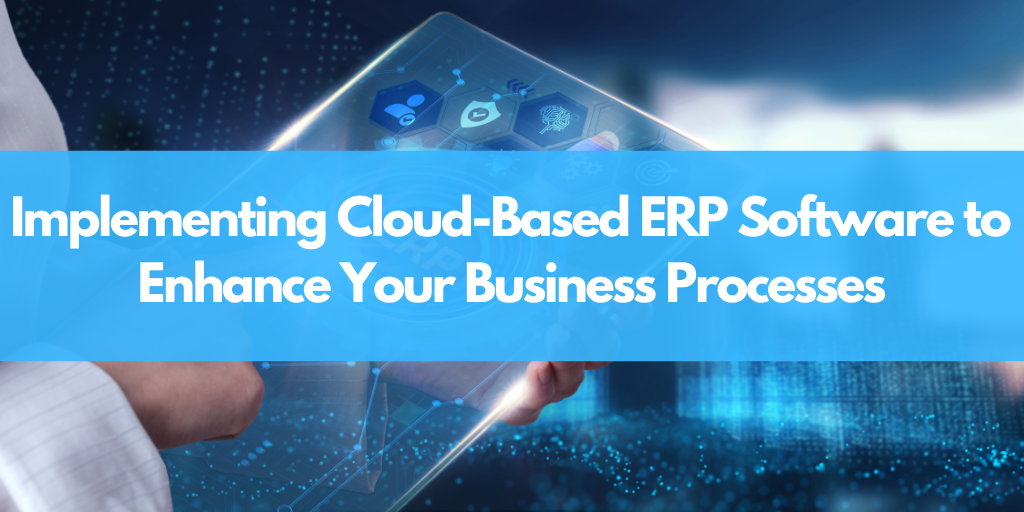
Implementing a Cloud-Based ERP Software to Enhance Your Business Processes
What are the biggest challenges you face as a small business owner? Maybe it’s tackling more than one job at a time, juggling inventory and accounting records, or keeping track of employee activities. If that sounds like you, you’re not alone. In fact, these issues are common among all businesses. The solution to many of these problems is implementing cloud-based ERP software. Cloud-based ERP software reduces the need for in-house IT staff and other back-end processes by putting company data into an online system accessible from anywhere. It also eliminates the need for onsite hardware and software by storing everything in the cloud. This article will explain why implementing cloud-based ERP software is the best solution for your business and how to get started with this process.
What is Cloud-Based ERP Software?
Cloud-based ERP software is a type of Business Process Management Software. It allows organisations to manage their core business processes from one centralised system instead of using multiple systems and software. Companies implement cloud-based ERP software by hosting the software in a third-party data centre and accessing it via the Internet. Cloud-based ERP software is often software-as-a-service (SaaS), which means that the software is hosted by a vendor, and you pay a subscription fee (usually monthly) to use it. This eliminates the need to buy and maintain your own server and software. The vendor is responsible for maintaining the software and providing any necessary updates. Cloud-based ERP software also offers a wide range of additional features and functionality that on-premise systems do not.
How Does Cloud-Based ERP Software Work?
Cloud-based ERP software allows you to access your business data from anywhere using a web browser and internet connection. This allows you to stay connected to your data, inventory, customer information and without the hassle of maintaining servers or hardware. Once you have implemented cloud-based ERP software, you can access it through a variety of devices including smartphones, tablets, laptops, and desktop computers. You can also access your data in real time or with a historical view, as well as be able to collaborate with other employees or partners from all over the world.
Cloud Benefits For Small Businesses
Cloud-based ERP software can help you manage your inventory, sales and customer relationships. Cloud-based ERP software allows you to manage all of your data online, right from your computer or mobile device. This reduces the amount of time you would spend entering data manually and allows you to manage all of your data in one place. Cloud-based ERP software allows you to access your data whenever you need it, wherever you are. This can help you increase productivity, reduce errors, and allow you to make better decisions – even when you’re not at the office.
3 Reasons To Implement a Cloud-Based ERP System
- Higher Productivity and Efficiency
Cloud-based ERP software allows employees to access data and make decisions from anywhere, making business processes and collaboration easier. This can help your team work together more effectively, allowing for better and faster decision-making. - Reduced Costs
Cloud-based ERP software requires less upfront investment and maintenance than an on-site system. You also don’t have to worry about paying for hardware, software updates, electricity and other costs associated with an on-site system. - Increased Security
Cloud-based ERP software is hosted in a data centre that is monitored 24/7, which can reduce the risk of cyber-attacks. Plus, data is encrypted to protect it against unauthorised access.
How To Go About Implementing Cloud-Based ERP Software
There are a few things to keep in mind when implementing cloud-based ERP software. First, you’ll want to make sure the vendor you choose is reputable and trustworthy. You’ll also want to consider the impact of your company culture. How will your employees react to the transition from a traditional system to a cloud-based system? Does your vendor offer training to help your team transition easily?
Finally, you’ll want to choose the appropriate vendor and plan that suits your needs. You’ll want to make sure the plan meets your current and future business goals. It’s also a good idea to look at multiple vendors and plans to make sure you’re getting the best deal.
Conclusion
Cloud-based ERP software is a great solution for small businesses to manage their core business functions. It offers more benefits than an on-site system and is cheaper to implement and maintain. Cloud-based ERP software also allows employees to work remotely, improving company culture and allowing for better work-life balance. By taking these steps, implementing a cloud-based ERP system will improve your business processes and help you meet your business goals.



